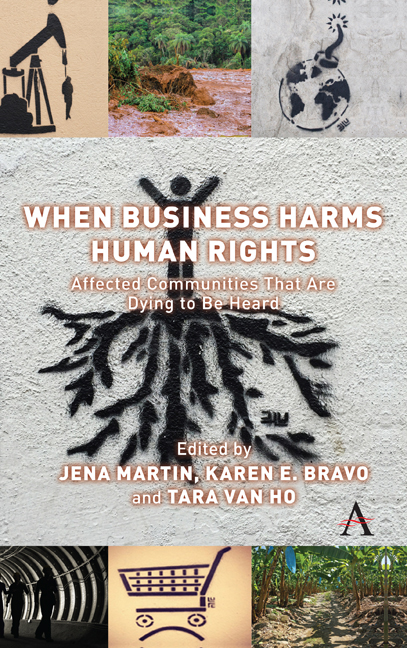Book contents
- Frontmatter
- Contents
- Preface
- Acknowledgements
- Introduction
- Chapter 1 Complicity in False Arrest, Imprisonment and Theft by a Fairtrade-Certified Company
- Chapter 2 Hindrances to Access to a Remedy in Business-Related Cases in Colombia: The Case of Gilberto Torres
- Chapter 3 The Global Pursuit for Justice for DBCP-Exposed Banana Farmers
- Chapter 4 The Rupturing of the Dam and the Community’s Social Fabric: A Testimony from an ‘Atingido’ from Bento Rodrigues, Brazil
- Chapter 5 Taming the Dragon, Unpacking Options for Access to Remedy for Violations by Chinese Multinational Corporations Operating in Chiadzwa, Zimbabwe
- Chapter 6 Máxima Acuña: The Story of How a Business Impacted Human Rights Defenders
- Chapter 7 Community Interrupted, ‘Life Projects’ Disrupted: Cajamarca, Ibagué, and the La Colosa Mine in Colombia
- Chapter 8 Occupational Health as a Human Right: A Case Study in a Turkish Free Trade Zone
- Chapter 9 The Price of the ‘Black Dollar’: Veteran Coal Miners and the Right to Health
- Chapter 10 Abandoned: A Tale of Two Mine Closures in South Africa
- Conclusion
- Appendices
- List of Contributors
- Index
Chapter 5 - Taming the Dragon, Unpacking Options for Access to Remedy for Violations by Chinese Multinational Corporations Operating in Chiadzwa, Zimbabwe
Published online by Cambridge University Press: 20 January 2022
- Frontmatter
- Contents
- Preface
- Acknowledgements
- Introduction
- Chapter 1 Complicity in False Arrest, Imprisonment and Theft by a Fairtrade-Certified Company
- Chapter 2 Hindrances to Access to a Remedy in Business-Related Cases in Colombia: The Case of Gilberto Torres
- Chapter 3 The Global Pursuit for Justice for DBCP-Exposed Banana Farmers
- Chapter 4 The Rupturing of the Dam and the Community’s Social Fabric: A Testimony from an ‘Atingido’ from Bento Rodrigues, Brazil
- Chapter 5 Taming the Dragon, Unpacking Options for Access to Remedy for Violations by Chinese Multinational Corporations Operating in Chiadzwa, Zimbabwe
- Chapter 6 Máxima Acuña: The Story of How a Business Impacted Human Rights Defenders
- Chapter 7 Community Interrupted, ‘Life Projects’ Disrupted: Cajamarca, Ibagué, and the La Colosa Mine in Colombia
- Chapter 8 Occupational Health as a Human Right: A Case Study in a Turkish Free Trade Zone
- Chapter 9 The Price of the ‘Black Dollar’: Veteran Coal Miners and the Right to Health
- Chapter 10 Abandoned: A Tale of Two Mine Closures in South Africa
- Conclusion
- Appendices
- List of Contributors
- Index
Summary
Let her sleep. When the dragon awakes, the world will tremble
– Napoleon BonaparteWhen Bonaparte made this proclamation in the eighteenth century, he may well have been envisioning the current global economy. Since the People's Republic of China (China) opened its doors to the West 30 years ago, there has been a dramatic change in its economic fortunes. China is now a formidable global economic player and was the top exporter of the world with the value of its exports in 2012 being 1.4 times the value of exports of the United States, the second largest exporter. The economic transformation of China has required, and will continue to demand, massive quantities of resources, and akin to other major powers in modern history, China is looking outward to find them. Africa, with its abundant natural resources, provides a natural location in this quest and the figures speak for themselves.
While China's interest in Africa is hardly new, the scope and scale of the burgeoning Sino-African trade is unprecedented. To a large degree, China pursues its global acquisition strategy through multinational corporations (MNCs). The marked presence of Chinese MNCs on the global stage is changing the landscape of international business and politics. Highly competitive and strongly supported by the state, Chinese MNCs are embarking on an acquisition drive that is capturing key resources and market share across the continent. Western firms, which once had virtually undisputed command over international financial resources and the requisite political and historical ties to dominate global business, are now being challenged. Nowhere is this trend more evident than in Zimbabwe where trade with China has steadily risen due to various factors, including the imposition of sanctions and trade restrictions by the European Union (EU) and the United States.
However, many Chinese corporations are tainted by allegations of persistent abuses, including, poor health and safety conditions, regular 12-hour and 18-hour shifts involving arduous labour and anti-union activities, all in violation of national laws or international labour standards. This is despite the fact that, globally, a number of MNCs have sought to align their activities with the UN Guiding Principles on Business and Human Rights (UNGPs).
- Type
- Chapter
- Information
- When Business Harms Human RightsAffected Communities that Are Dying to Be Heard, pp. 71 - 86Publisher: Anthem PressPrint publication year: 2020



